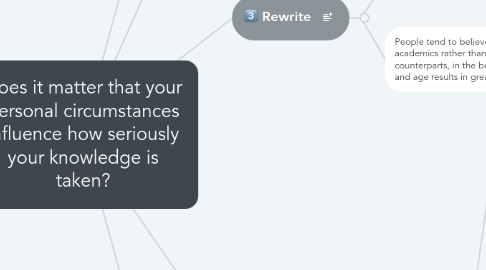
1. Keywords
1.1. Influence
1.1.1. What is implied in the word ‘influence’?
1.1.1.1. Meaning what impact does this have on our perception of reality?
1.2. Personal
1.2.1. What is implied in the phrase ‘personal circumstances’?
1.2.1.1. Is it age, gender, race, economic situation?
1.3. Knowledge
1.3.1. What kinds of knowledge?
1.3.1.1. Perceived or personal knowledge
2. Key Phrases
2.1. Personal circumstances
2.1.1. What does personal circumstances mean?
2.1.1.1. In the case of Greta Thunburg, it is clear that she receives many skeptics- can this be credited to her personal circumstances as a teenager and coming from a privileged background?
3. Rewrite
3.1. There are a few pivotal phrases to re write
3.1.1. Firstly, a definition of personal circumstance. In my opinion, personal circumstance can be in relation to someone's economic situation, age, gender or race
3.1.1.1. Definition of influence: How does this affect people's ability to take certain stances seriously?
3.2. People tend to believe the work of older academics rather than their younger counterparts, in the belief that experience and age results in greater accuracy
4. Rewrite
4.1. Through the eyes of many scientists, experience amounts to validity
4.1.1. Nobel Laureates
4.1.1.1. This is especially true in specialised fields
4.2. In the human sciences, when describing a certain phenomenon, it is important to be well versed and knowledgable in the message being advocated
4.2.1. Greta
4.2.1.1. In the case of human sciences and humanitarian work, where a university degree or job experience may serve to increase the validity of the campaign and message
5. Connections to Classes
5.1. Humanitarian
5.1.1. Natural Sciences
5.1.2. Greta
5.1.2.1. Views on Climate Change
5.1.2.1.1. Reason
5.1.2.1.2. Belief
5.2. Math and Science
5.2.1. Natural sciences
5.2.2. Nobel Prize
5.2.2.1. To this date, scientists who are of older age tend to receive nobel prizes, rather than their younger counterparts
5.2.2.1.1. Data from the Nobel Prize website
5.2.2.1.2. Personal Bias

